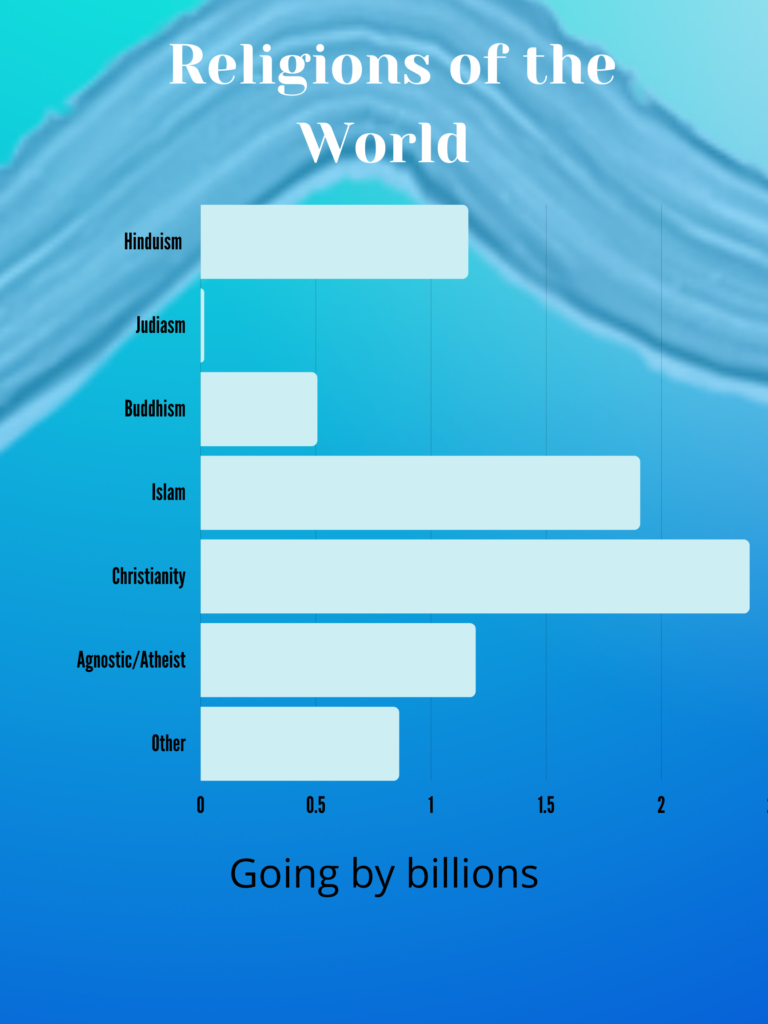There are questions that can never be answered. Questions like, “what happens after death?” and “ Who created our universe?” or “Did someone create our universe?”
These are questions people all over the world seek to answer - and people believe they have it. Those answers are what creates religions.
If you don’t know what a religion is, it is a system of faith where people believe in things such as a higher power, or powers. Religions usually have a sacred book, telling about its history and its beliefs.
There have been thousands of religions throughout the years, but how has religion changed in modern times? To answer this question, it would be important to look at the most popular religions today.
Popular Religions Today
Judaism: a religion founded by Abraham in 18th Century BCE, Judaism is one of the oldest monothestic religions. Adherents of Judaism, Jews, worship at holy places called synagogues. Their holy leaders, Rabbi’s, go through academic studies, where they study the Tanakh and the Talmud. The Torah, the first 5 books of the Tanakh, consists of 613 commandments that explains how Jews are supposed to live.
Christianity: a religion formed in the first century CE, Christianity stemmed from Judaism. Christianity claims that Jesus Christ is the Messiah, or savior, who came to the earth to die for their sins. Adherents of Christianaty, Christians, believe that Jesus is the son of God. They get their core beliefs from their holy text, the Bible.
Islam: a religion formed by Muhammand in 7th Century CE, Islam is a religion that follows Muhammand, believing that he is the last in a long line of prophets. Adherents of Islam, muslims, follow the 5 pillars, Shahada, Salat, Zakat, Sawm, and Hajj.
Hinduism: a religion predominantly in India, formed around 1500 BCE. Unlike most religions, in modern day Hinduism is polythestic. Hinduism Has no 1 founder, instead it's a blend of beliefs, that then evolved into a religion.
Buddhism: a religion founded by Siddhartha Gautama in 5th century BCE, Buddhism is a religion that teaches that the human life is a life full of pain and agony, and that meditation, spiritual labor, and physical labor is the only way to reach nirvana. Nirvana is a state where there is no suffering or desire, and that you are released from karma and the cycle of death. Nirvana is the ultimate goal in Buddhism. Unlike most religions in modern day, Buddhism isn’t about believing or not believing in any god or gods.
In these religions, 3 out of the 5 of them are monotheistic. Most of these religions also help adherents of those religions how to live. All these religions also in some way teach what their afterlife is, and how to gain access to their afterlife.
But how do these religions differ from other religions of the past? Well it would be important to know what they are and their beliefs.
Popular Religions In History
Greek Mythology: is a polytheistic religion that believes in multiple gods, most of which reside in Olympus. Greek Mythology is less of a way to live, but more of an explanation on how the world works. For example, Poseidon controlling the ocean, and making horses out of sea foam. In Greek Mythology , it is believed that when you die, your soul is separated from your corpse and you start your journey to the underworld. At the entrance of the underworld resides Charon to boat them across the river of Acheron, which divides the world of the living and the world of the dead. Souls pass Cerberus, a three headed dog who protects the gates of the underworld. Once souls get through the gates they are met with Judges of the underworld who decide where souls go.
Egyptian Mythology: the religion based on a collection of myths and stories from ancient Egypt. These myths and stories can be found through paintings and drawings and hieroglyphics from ancient Egypt.
You can see that these religions of the past are more based on myths and folklore. These religions also instead of teaching how to live, it explains how the world is. Like how things happen on earth.
Whereas modern religions teach more on things that can’t be explained nowadays.
Modern religions are also less based on culture, and aren’t in one place, with a few exceptions like Hinduism, but older religions are more stationary, staying in their place of origin.




